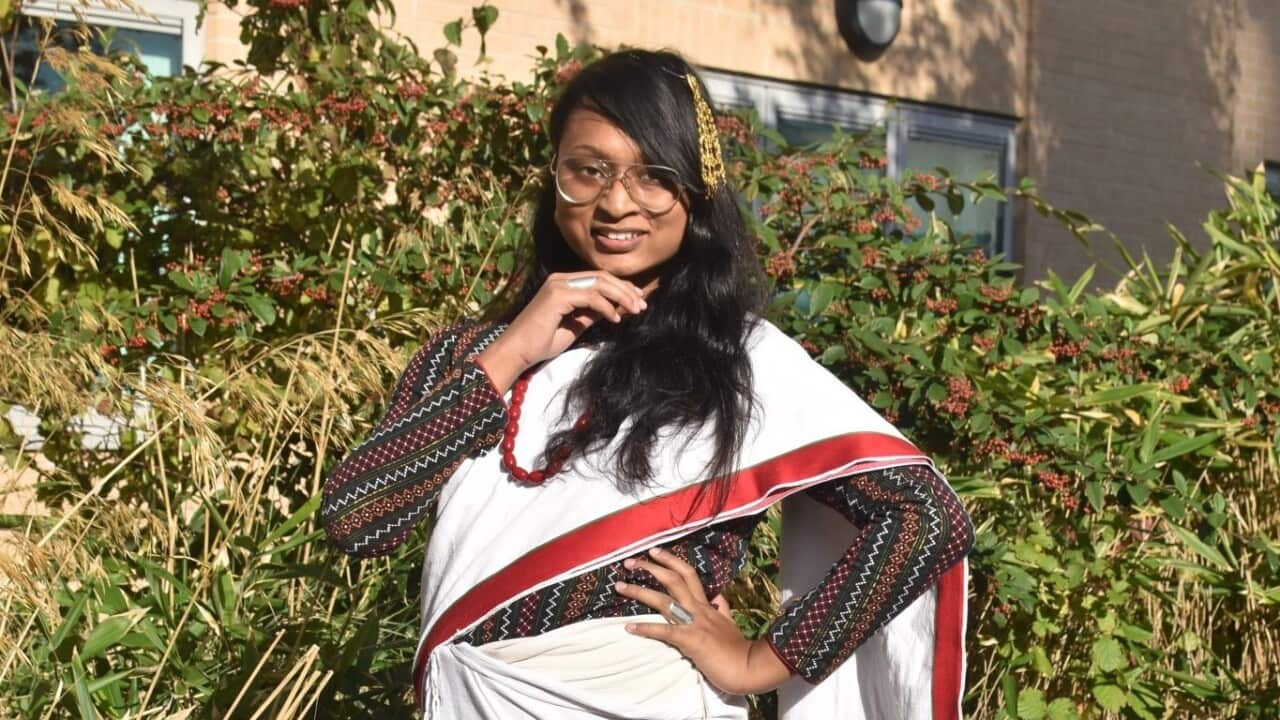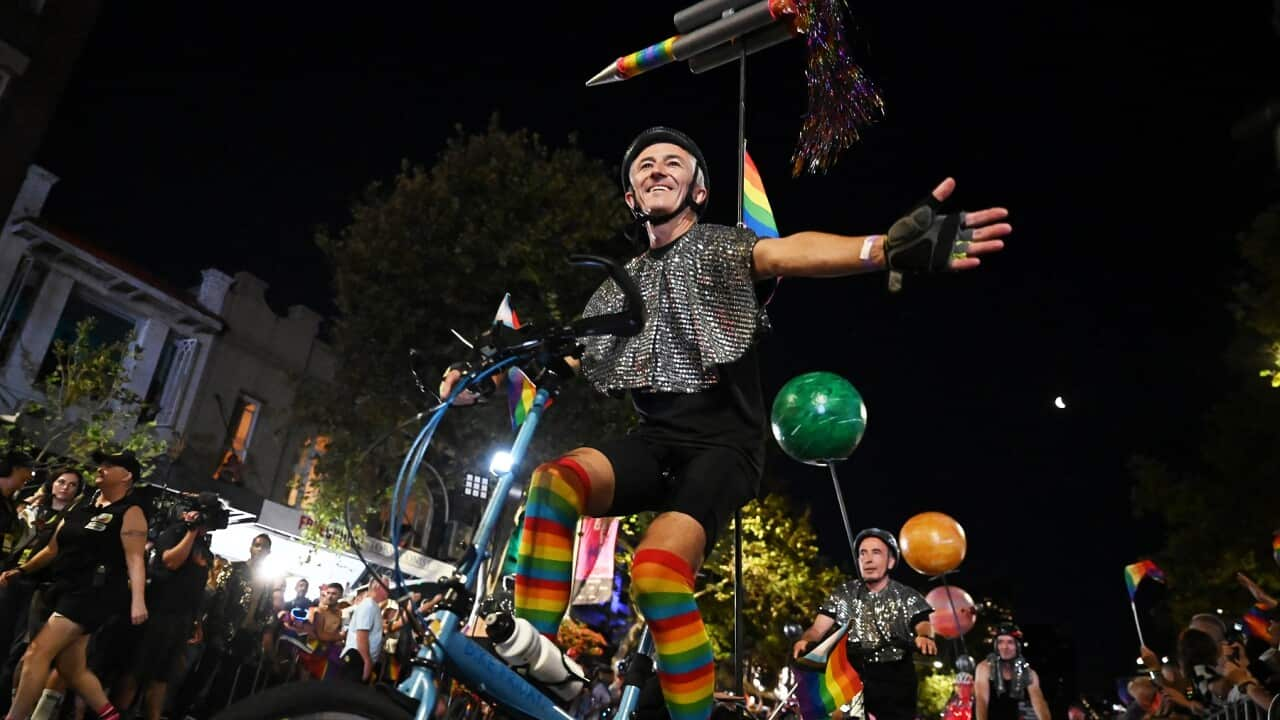

This article is more than 2 years old
'Open your heart, be yourself': Multicultural Australians find voice at Sydney's Pride March
On Sunday, the iconic Sydney Harbour Bridge gleamed in rainbow colours as more than 50,000 people took part in the city’s first Pride March.
Published 7 March 2023 4:01pm
Updated 18 November 2024 8:48am
By Dinita Rishal
Source: SBS
Image: In this aerial view, the Progress Pride flag is carried over the Sydney Harbour Bridge as people take part in Pride March on March 05, 2023 in Sydney, Australia. (James D. Morgan/Getty Images for Destination New South Wales)
Key Points
- More than 50,000 marchers impart message of acceptance and equality
- For many, it was a chance to show solidarity with people unable to come forward
- Calls for more awareness on LGBTIQ+ issues in modern Australia
Carrying a message of LGBTIQ+ recognition and equality, the parade on March 5 marked the end of WorldPride, an event held in Sydney for the first time that included the annual Mardi Gras.
For many, it was an opportunity to celebrate their identity and raise their voice about the need for more awareness and acceptance towards LGBTIQ+ communities in modern Australia.
Acceptance of diversity
Lani McLachlan was one of the thousands of marchers present at Hyde Park on Sunday morning.
She said Australia has come a long way over the past few decades.
“It [the march] joins everyone together. There is no judgement on your sex or what you are. Everyone is equal,” the 68-year-old Indigenous Australian woman told SBS Nepali.
“Thirty years ago, you wouldn’t have done this. In the '80s, when they had the gay bashings, it was like – why would you want do that to someone because they’re different?
You should be proud to be different. Open your heart and eyes and have a look at the real world.Lani McLachlan

Lani McLachlan at Hyde Park during the Sydney WorldPride March on 5 March 2023. Credit: SBS Nepali/Dinita Rishal
Shrestha, who was accompanied by his family, said he wanted to teach acceptance to his children.
“In Sydney, people are very diverse, all kinds of people live here. I want my children to learn that they should appreciate diversity, and honour everyone’s identity and respect them,” he told SBS Nepali.
“LGBTIQ+ awareness is slowly increasing in the Nepali language-speaking community too.”

Keshav Shrestha (R) with his family at the 2023 WorldPride March in Sydney. Credit: SBS Nepali/Dinita Rishal
Celebration of identity
For Edward Zhang, the event was more than just a march. It was a celebration of his personal journey.
“I had been agonising over it for many years, but last year I gathered the courage to tell my parents I’m gay. They did not take it very well... My parents came here in the late '70s and did not have proper exposure to this topic. It’s much better now,” the 29-year-old said.
“It’s a really big moment for me to see so many people in support, for me to have to come out last year, and come out now and walk in a parade like this is a very special moment.”
While he credits his sister and friends for being his biggest allies, Zhang said the topic of sexual orientation can be a complicated one for immigrant parents when it comes to their children.

Edward Zhang (R) with his sister Lily Zhang (L) at Sydney's Hyde Park after the WorldPride March. Credit: SBS Nepali/Dinita Rishal
For children, come out on your own terms. If it’s not right for you, then don’t come out. Find support, find allies, that’s the biggest thing I can say.Edward Zhang
Tushar, a Canberra resident, highlighted why acceptance was important for them.
“To me, being queer means acknowledging and accepting your and other people’s weirdness, and taking pride in things that are not normalised in society,” they said.
“Queer is a term that was used as a derogative, but it has been taken by the community. People can choose to identify with words, or not identify with words - it's completely up to them.”

Tushar (R) and Swastika (L) spoke to SBS Nepali about what being queer means to them. Credit: SBS Nepali/Dinita Rishal
Raising a voice for the ones who cannot
For Alfred Pek, who was representing the Indonesian community, this Pride March was an experience “beyond words”.
“To be able to represent the millions of people who are voiceless, where the discourse of the queer history and the narrative is regressing - it's quite an overwhelming mix of emotions,” he said.
“Because on one hand, I am proud and able to speak on behalf of the community because of the privilege that I'm in the position with. But on the other hand, I'm quite alone. There are not as many people from the Indonesian community who have this kind of opportunity.”
As I started to come to terms with my queer identity, I realised that I am in a position of privilege. I can speak on behalf of the people that cannot. And I am willing to do so now, and for the rest of my life.Alfred Pek

Alfred Pek was representing the Indonesian LGBTIQ+ community at the Pride March. Credit: Ashley Mar
“It has been so powerful to see the absolute town out, and seeing people walk around with national flags and symbols of their culture,” she said.
“I am here today with the Lebanese flag to represent the queer Middle Easterners, especially back home in Lebanon at the moment. It is quite difficult politically for my queer siblings back in my motherland.”

Jasmine (L) with her fiancee at the WorldPride March. Credit: SBS Nepali/Dinita Rishal
Calls for more awareness
Despite growing openness, marchers believe there needs to be more awareness about LGBTIQ+ issues in modern Australia.
Swastika, from India, believes that it is an individual’s responsibility to educate themselves.
“It’s the person who is not aware about the meaning, it is their job to educate themselves," she said.
"It's not the person who is queer to do the educating part. It is everyone's prerogative at this point, where we all are exposed to different types of media.”
If somebody is not aware of what queer means, it is their responsibility to educate themselves.Swastika

Lani McLachlan told SBS that LGBTIQ+ community members with disabilities need more support. Credit: SBS Nepali/Dinita Rishal
“We struggle to look out for ourselves. I couldn’t get in the Mardi Gras march because I am on a scooter,” she said.
“It's very, very hard for people with disabilities, like me, because I am unable to walk long distances. And it makes it very hurtful for me because many don’t seem to understand that you are still a human being inside, and you should be accepted for who you are.”

Marchers at the Sydney World Pride March 2023. Credit: Ashley Mar
“It’s definitely getting scary here as well - we are seeing a lot of transphobia,” said Jasmine.
“There was a march through Newtown from a kind of fascist organisation the other day.”
Zhang said, “Earlier this year in Brisbane, someone just came out to my face and said a homophobic slur.”
“Awareness is more focused on the CBD. But in the suburbs, historically, we haven't seen much awareness. And that’s exactly what is happening with WorldPride this year.”
Share


